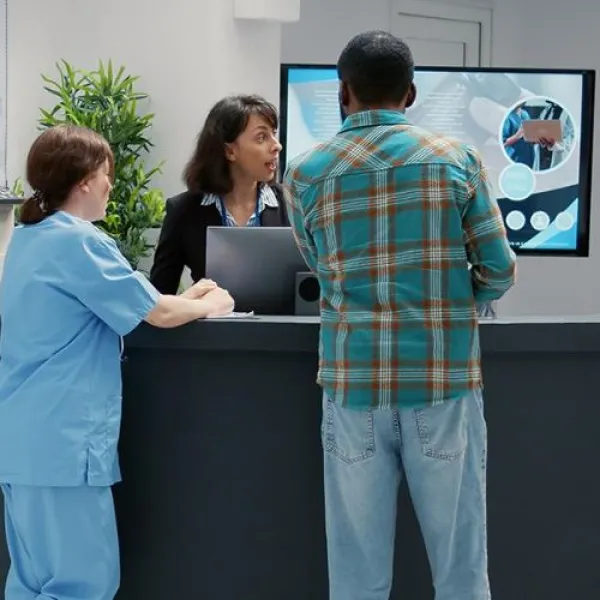Enhancing hospital efficiency and improving patient flow with RFID and location tracking solutions
In today's fast-paced healthcare environment, hospitals face numerous challenges when it comes to efficiently managing patient flow.
Delays in care, confusion, and inefficiencies can lead to compromised patient safety and overall dissatisfaction. However, with the use of RFID and location tracking technologies, hospitals now have a powerful tool at their disposal to streamline operations, enhance efficiency, and improve patient flow.
In this blog post, we will explore how RFID and location tracking technologies can revolutionise hospital management and positively impact patient experiences.
Streamlining patient admissions and discharges
Patient flow is essential to a positive patient experience and reducing backlogs. However, manually coordinating teams at the right time can be demanding in an overrun hospital. Busy staff, from nursing to cleaning teams, need to anticipate the next action required to expediently free up resources for the incoming patients.
RFID and location tracking technologies enable hospitals to automate and expedite the admissions and discharge processes. By equipping patients with RFID wristbands, their movements can be accurately tracked throughout their stay. This allows hospital staff to anticipate patient arrivals, prioritise their needs, and allocate appropriate resources. Automated check-ins and check-outs not only save time but also reduce administrative burden and enhance patient satisfaction.
Enhanced capacity on the wards and in theatres
Healthcare organisations can also increase service capacity by automating small, scalable parts of the patient flow diagram. Real-time bed management can transform hospital workflows for the better.
Shrewsbury and Telford Hospital NHS Trust uses radio frequency identification (RFID) to track the movements of 1309 medical devices including 846 beds. RFiD Discovery allows technicians to locate beds and other mobile devices quickly, reducing disruptions between each step of the care pathway to improve patient experience.
Optimising staff efficiency and communication
Efficient allocation and tracking of hospital resources, including staff and equipment, is crucial for smooth operations. RFID and location tracking technologies provide real-time visibility into the location of personnel and assets. Hospital management can identify bottlenecks, adjust staffing levels, and monitor the availability and utilisation of vital equipment, such as wheelchairs or infusion pumps.
This helps to streamline workflows, minimises wait times, and ensures the right resources are in the right place at the right time.
Improving asset and inventory management
Managing medical supplies, medications, and inventory can be challenging in a bustling hospital environment. RFID and location tracking technologies enable automated inventory tracking and real-time updates on stock levels. This eliminates the need for manual inventory counts, reduces waste, prevents stockouts, and ensures timely restocking. By optimising supply chain management, hospitals can improve overall efficiency and guarantee the availability of critical resources.
Our research shows mobile medical device and asset loss costs millions of pounds each year and detriments efforts to improve patient flow. For instance, certain medical procedures require a bladder check to be performed on patients before they can be discharged. While the patient is keen to go home, and the staff are keen to free up a bed for another waiting patient, time may be lost by manually searching for the scanner device.
Our healthcare tracking technology is used by many medical organisations and NHS trusts to track handheld devices and surgical equipment. Armed with accurate location updates, staff can improve their productivity, enhance patient experience, and eliminate delays in care.
Enhancing patient safety and security
Patient safety is a top priority in healthcare facilities. RFID and location tracking technologies contribute to enhancing patient safety by enabling the monitoring of high-risk patients, preventing wandering, and reducing the chances of medication errors. Real-time alerts can be triggered if a patient moves into an unauthorised area or if medication administration deviates from the prescribed protocols. These technologies also aid in maintaining the security of sensitive areas, preventing unauthorised access, and protecting patients' privacy.
RFID and location tracking technologies have the potential to transform hospital operations, improve patient flow, and enhance overall efficiency. By leveraging these innovative tools, hospitals can optimise resource allocation, streamline workflows, reduce wait times, enhance patient safety, and ultimately deliver better patient experiences. As the healthcare industry continues to evolve, embracing these technologies will be crucial for hospitals seeking to stay at the forefront of efficient and patient-centric care.
Get in touch today to find out how our solutions could help improve patient safety and staff efficiency in your healthcare setting, or discover more by reading our latest news and blogs.



